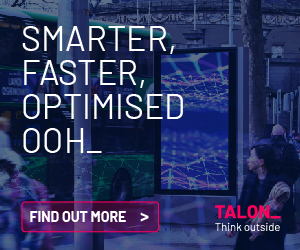
Core, Ireland’s largest marketing communications company, is forecasting that total media spend in Ireland will grow by just 0.6% in 2019 to €1.044 billion.
As with previous years, online will deliver the growth in the market, albeit at a slower rate than before, while offline media will see a third consecutive year of decline, with overall spend falling 4.5% to €525 million. Meanwhile, the level of total media spend in Northern Ireland is expected to increase by 2.1% to £188.8 million (€214.5m).
The figures are contained in Core’s annual ‘Outlook’ report which forecasts spend for 2019 across a variety of media, including Video, Audio, Print, Online, Sponsorship and Out-of-Home. The report also outlines the key developments and important issues that will impact the industry this year.
However Core says that a so-called hard Brexit is not factored into the predictions for 2019. In the unlikely event that the UK does crash out of Europe, the impact on marketing budgets both here and in the UK will be significant, it says.
“While commentary from the UK suggests that a hard Brexit could result in a 5% decline in advertising investment there, the Republic of Ireland market is even more exposed: approximately 25% of advertising spend here is allocated from the UK in sterling. Economists believe that a hard Brexit will result in sterling falling in value by a further 10%, which- when combined with weaker sentiment in the Republic- would see investment levels contract by as much as 9% here,” it notes. In the case of Northern Ireland, a hard Brexit would result in a smaller decline, of circa 4%, due to anticipated increases in government spending on information campaigns specific to that region. Government spend remains a significant category in Northern Ireland. Offline media would bear the brunt of the declines in each market.”
In an effort to develop a robust set of projections and forecasts for the Irish advertising market, that have industry buy-in, Core says the media and advertising industry needs to come together to address the often wildly different forecasts that are published at the beginning of each year.
Alan Cox, CEO of Core, says that it has invited IAPI to manage the project. “In 2019, we still rely on conjecture to estimate the value of the media market in the Republic of Ireland and Northern Ireland. This approach results in very different figures being quoted across the market. This needs to stop; we must agree an industry-wide approach that reports real, approved numbers. To facilitate this, Core has invited the industry’s representative body (IAPI) to establish a committee, with representation from all stakeholders, to manage this project. We are not suggesting that the advertising revenue of each individual media owner be published – that is unnecessary- but what is necessary is an accurate breakdown of total spend by medium. An independent third party, such as an accountancy firm, could facilitate this, while protecting the confidentiality of company-level information. A similar process is already in place for TV (managed by TAM Ireland) which employs a third party to establish an accurate commercial revenue number for TV (as a whole) from individual spends supplied by each.”
In a bid to ensure that Ireland has a sustainable media market for the future, Core is also calling on the Government to commission an independent report to examine the state of the news media in Ireland, the threats of the financial stability of publishers, the impact of search engines and social media platforms and the role of digital advertising. It points out that it is critically important for Ireland to have a “thriving, ambitious, inquisitive, energetic news media” and the Irish government must realise the pivotal role that all our indigenous media play in our culture, values and national identity.
“There is a strong, positive link between media consumption and national belonging. We cannot take risks with this – it is a national crisis-in-waiting. Other countries are taking this matter seriously. For example, the Cairncross review into the sustainability of high-quality journalism, commissioned by the UK government, was published recently. The report found that investigative journalism, public-interest new and democracy reporting are the areas of journalism most worthy and most under threat for the market power of online platforms. It made several recommendations to create a better balance between publishers and platforms and to persuade the online platforms to use their position in more accountable ways. The Irish Government should follow the UK’s example and conduct a similar review here,” says Cox.
Some of Core’s key predictions for 2019 include:
Television: While television revenue grew by just 1% to €221.3 million in 2018, driven by sponsorship and promotions, TV spend will contract in the Republic of Ireland in 2019, dropping by 2.9% to €214.9 million. TV remains the medium of choice for brand-building, accounting for one third of media spend for Ireland’s top 20 advertisers. However, the next few years will be challenging with modest growth levels, as Facebook and Google continue to increase their share of the video market.
Online Video: The online video market in the Republic was worth €77.8 million in 2018, representing growth of 29% on 2017. This year, the market will increase by 24% in the Republic of Ireland to €96.1million, with Facebook and YouTube securing as much as two thirds of the additional €18.3 million spend this year.
Radio: In 2018, radio recorded a 4.6% decline in spend to €117.6 million in the Republic of Ireland. Core expects 2019 will be another difficult year for radio, with overall revenue in the Republic of Ireland falling by 5.5% to €111.1 million. Podcast listenership is growing, with 19% of internet users in the Republic of Ireland listening to this format on a weekly basis, across an increasing array of platforms.
Print: Overall print spend in 2018 fell by 10.6% to €119.9 million. Core predicts that the Republic of Ireland print market will contract by 11.1% in 2019 to €106.7 million, with national newspapers falling by 12.0% to €85.2 million.
Cinema: 2018 was a tough year for cinema in the Republic of Ireland, with overall spend falling by just under 5% to €7.37 million. A decline in the alcohol category was the major factor in the decrease. An increase in audiences, coupled with a minimum of four new cinema openings planned this year, should see marginal growth of 0.6% to €7.41 million.
Search:– Investment in search is expected to grow by 9% in 2019. This could fuel further inflation, but with Amazon search expected to become available in Ireland late in 2019, costs could drop towards the end of the year. Search advertising will account for over half of all online media spend in the Republic of Ireland and Northern Ireland.
Online: The overall online market in the Republic of Ireland is expected to increase by 6.3% to €519.5 million. Despite all the issues surrounding Facebook last year, it will continue to increase its share of the online display market from 44% to 49%, with revenue totalling €108 million. This is driven by an estimated 30% growth in video revenue at Facebook this year.
Out-Of-Home: Advertising investment across all OOH formats is expected to increase by 1.8% in 2019, with revenue of €84.4m, with Digital OOH achieving a 25% share of all OOH spend. 2019 will be an interesting year for OOH, with the implementation of the Public Health (Alcohol) Bill imposing significant restrictions on how alcohol brands use the medium. Up to 60% of all panels in the country could be disqualified from alcohol advertising.
Sponsorship: Growth of 8% in all sponsorship to €189 million is expected, with sport continuing to dominate with rugby and GAA assets in greatest demand.






















